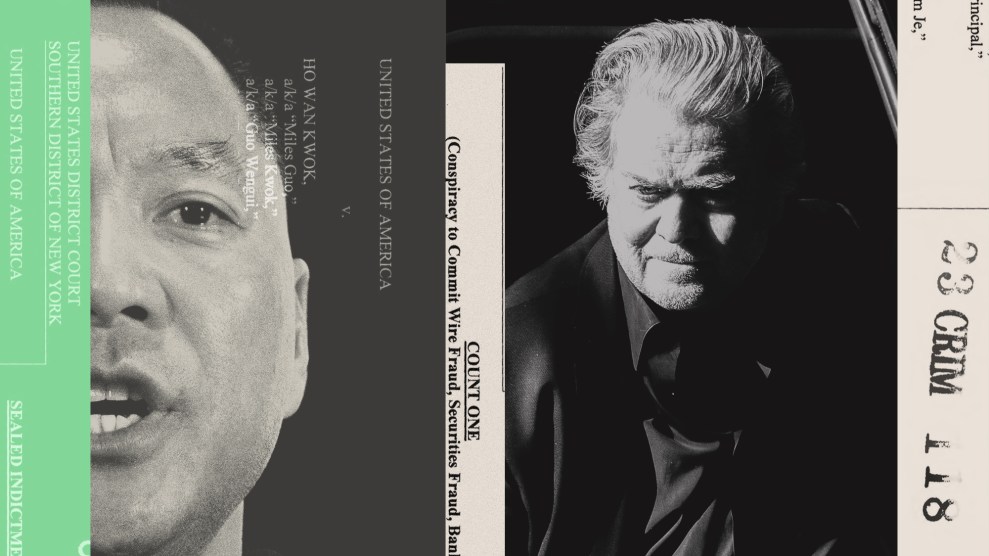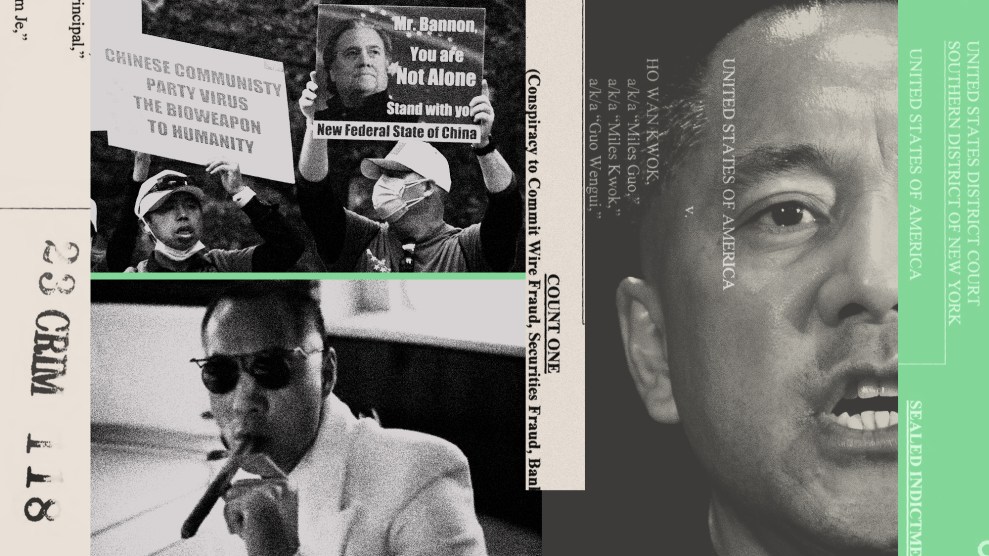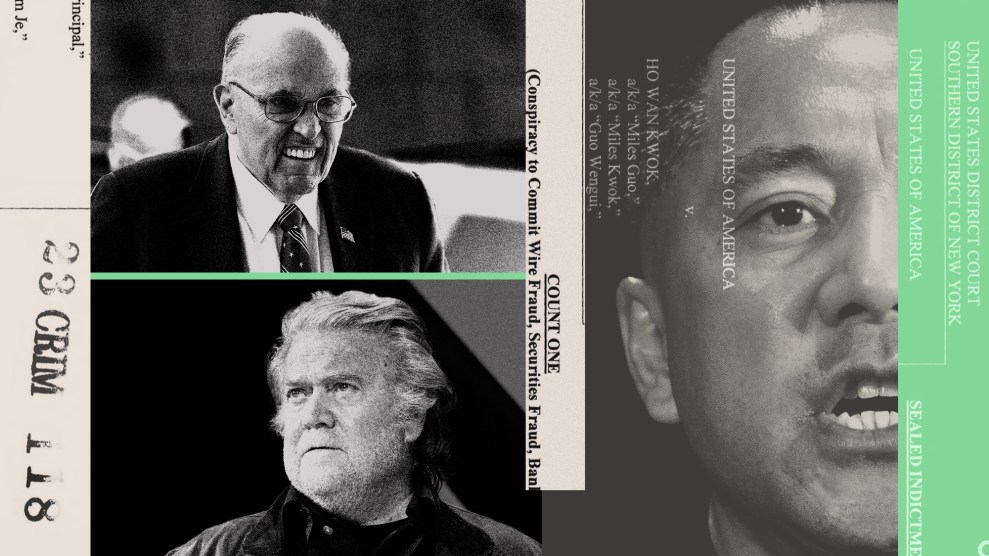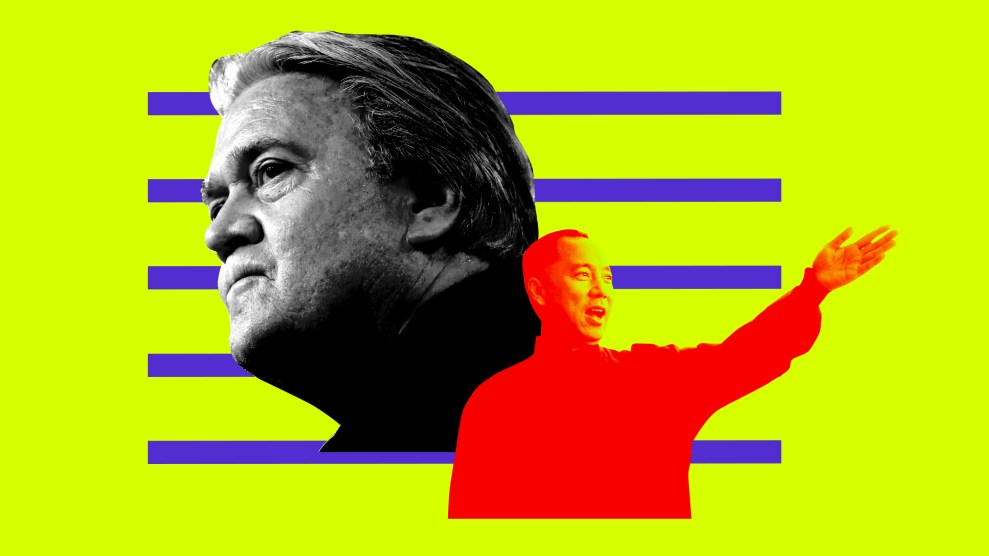
Mother Jones; Don Emmert/AFP/Getty; David Dee Delgado/Getty
On Tuesday, prosecutors in the federal trial of fugitive Chinese mogul Guo Wengui introduced a video that, they said, marked the moment Guo began executing a massive fraud against backers of his anti-Communist political movement.
But the first image that appeared on courtroom screens wasn’t actually Guo. It was his better-known ally and former well-paid adviser, Steve Bannon, wearing glasses and a few black shirts. And when the video rolled, the courtroom heard Bannon announce at a November 2018 news conference that Guo had committed “to establish a $100 million fund immediately” to support democracy and the rule of law in China.
That was not true. Guo never gave a more than sliver of that to the fund, but instead used his pretend pledge to convince opponents of the Chinese Communist Party, or CCP, to cough up their own money. That was the initial step in a years-long scheme to fleece his fans, according to the Justice Department. Here was a foundational lie of Guo’s alleged $1 billion fraud, and it came from Steve Bannon’s mouth.
On Thursday, prosecutors played another video of a meeting that, they alleged, led to Guo in 2020 misappropriating $100 million from investors in his video streaming company, GTV. But again, the first image jurors saw was Bannon, who brokered and attended a Dallas meeting where Guo was interviewed by Kyle Bass, who heads a hedge fund to which Guo later sent the money. Bass, who is not accused of wrongdoing, declined to comment.
Prosecutors have called Bannon a “co-conspirator” in an alleged racketeering conspiracy led by Guo, but Bannon so far hasn’t been charged in the case. His prominent role in the first week of trial, which is expected last into July, may leave jurors wondering why the former Trump strategist is not also on trial. Bannon has declined to comment on his alleged role in the Guo case.
Guo, a former Chinese real estate mogul who fled to the United States in 2015 ahead of criminal charges in Beijing, built a brand as a leading critic of the CCP. He leveraged that reputation to attract thousands of devoted fans in the Chinese diaspora, receiving substantial help from Bannon, who needed a new patron after his ouster from the White House in 2017. Bannon helped launch Guo’s nonprofits, and he advised on several for-profit ventures that prosecutors say Guo used to defraud supporters.
Bannon appears to have more pressing legal concerns. He may soon have to serve a four-month sentence for contempt of Congress. He is also set to face a trial for allegedly defrauding an unrelated MAGA-linked charity. He denies wronging in that matter.
But while the Guo case may not be a top legal threat for Bannon, it sure makes him look bad. Prosecutors argue that Guo’s anti-CCP movement was largely a con, launched to draw in suckers who bought Guo’s political claims and then fleece them via fraudulent investment offerings. Bannon helped create that supposed movement and reliably touted Guo’s often outlandish claims and dubious financial schemes. In the government’s telling, Bannon lent his celebrity to help Guo woo, and then rob, the hard-working Chinese immigrants who Bannon claims to champion.
“Without Bannon, Guo doesn’t have legitimacy, at least in the eyes of the Chinese,” Sasha Gong, a Chinese-American scholar who sat alongside Bannon on the board of one of Guo’s nonprofits before breaking with both men, said in an interview. Gong argued that pervasive corruption in China leaves many emigres believing financial success requires “some official backing.” Bannon, with his perceived ties to Trump, helped Guo create that illusion, Gong argued.
In 2020, Guo began selling shares in his GTV streaming company to his fans. He raised around $500 million from supporters, who received marketing material that said Bannon was on GTV’s board of directors. Many smaller investors never received stock or even receipts, and Guo embezzled most of the money raised, including by sending $100 million to Bass’ fund, according to the DOJ.
In 2021, Guo hawked a supposed cypto currency using what prosecutors said was a false claim that is was backed by gold, bogus boasts about blockchain technology, and a phony valuation. Bannon touted the currency as a “monumental success.”
Guo is accused of using funds he embezzled from this currency, from GTV, and from other ventures to purchase personal items like a Ferrari, a $35,000 mattress, a $65,000 television and a $26 million New Jersey mansion.
Guo has claimed an organization he and Bannon started, the New Federal State of China, will soon replace the Chinese Communist Party as the legitimate government in Beijing. In broadcasts that reached thousands of Guo followers, Bannon endorsed that notion, and he implied that a future US president could give the New Federal State, which has with no permanent staff and at the time was operating out of a Upper East Side townhouse, full diplomatic recognition.
That is wildly unlikely, but Bannon’s suggestion may have helped sell prospective Guo investors on the value of NFSC-linked offerings. Those include a pledge by Guo to provide people who invested $50,000 in one of his ventures with NFSC “passports.”
The political movement that Guo and Bannon touted took a hit Wednesday in testimony by former Guo employee Karin Maistrello, who served as the president of one of the Guo nonprofits, the Rule of Law Society, that Bannon helped launch in 2018. Maistrello said the organization’s stated goal of advancing democracy in China was phony.
The group did “nothing” to help people in China in the two years she worked there, Maistrello said. Instead it used the pretense of CCP opposition and other tricks to hit up Guo fans for money, she said. During a live-streamed 2019 fundraiser for the group, Guo underlings were ordered to temporarily move money from accounts he controlled to the Rule of Law Society so that fans watching would donate more, she testified. The original funds were returned to Guo’s account after the event, Maistrello said. That was “not real money,” she said, complaining that Guo had used it to dupe donors.
These efforts occurred while Bannon was chairman of the organization’s board. But Bannon was not closely involved, Maistrello testified. He attended a few meetings, but otherwise “didn’t really do anything,” she said.
Still, Maistrello said that Bannon was paid $1 million in four installments, starting that year, by a company Guo controlled. She said it was not clear if the money was payment for his work for the nonprofit or what company the money came from. Those payments appear to be separate from $1 million that Axios previously reported Bannon received from Guo Media for consulting starting in 2018.
A Guo company has also helped to fund Bannon’s War Room broadcast, paying at least $270,000 to the show in 2021 and 2022, according to submissions by the US Trustee in a bankruptcy case filed by Guo. Guo also gave Bannon use of a private plane, a Connecticut home, and his yacht, where Bannon was living when he was arrested on unrelated fraud charges in 2020. (Trump ultimately pardoned Bannon in that case.)
In Guo’s trial, even the defense has brought up Bannon. On Wednesday, Guo attorney Sidhardha Kamaraju cited Bannon to suggest that Guo was not personally responsible for the false claim that he would give $100 million to his charity.
“That’s not Guo himself, right?” Kamaraju asked a witness, referring to the person who announced Guo’s pledge to make the donation. “That’s Steve Bannon.”














